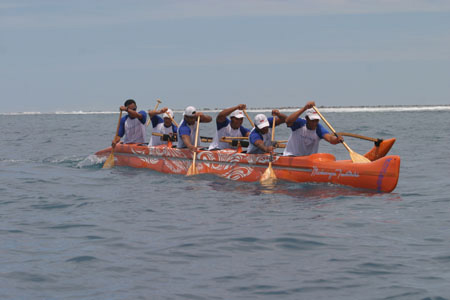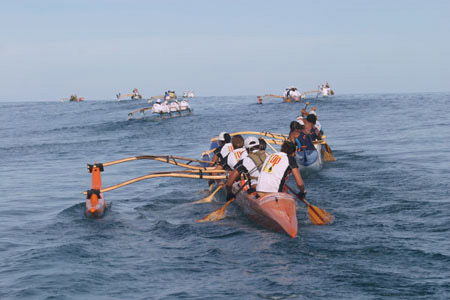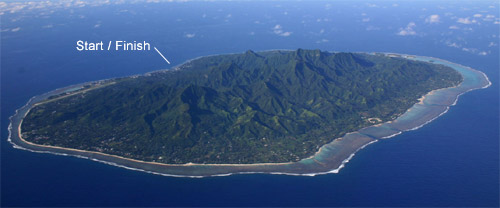The interaction and interface of Outrigger Canoeing
Written for George Fifield's DmPerspectives course
When I lived in Fiji I paddled for an Outrigger Canoe club. Outrigger canoeing is a special mix of an individual and team sport. The interactions with other players are nowhere near as immediate as a more "social" game like soccer or monopoly, but there is certainly a constant if subtle interaction between players.
Most obviously, the players need to keep in time with each other, or their power will be transferred to a slight lateral wiggle rather than full forward motion. Of course, since only one member of the canoe can actually see all of the other paddlers, this isn't as straightforward as it sounds. You can see the people in front of you, but must be attentive to the feel of the canoe to really tell if everyone is paddling together.
This is particularly pronounced for person who sits at the front of the canoe, as he can't see anyone! Since it is he who sets the pace for the entire canoe, it is very important that he be aware of the feel of the boat. Is it jerking around? Is he paddling too fast for the others? Are they chomping at the bit to pick up the speed or has he tired everyone out? Does the canoe feel smooth in the water?
You would think that this would involve a lot of verbal instructions, but my team's style of paddling was to only vocalize for encouragement or in very crucial moments. Remember that this all takes place in the Ocean, with crashing waves, shifting currents and sharp reefs hiding beneath the surface, so a boat full of noisy people is not ideal for tight control and quick reactions as a six-person unit. Moreover, many of these races last three or four hours under the hot South Pacific sun, so your teammates' voices can get really annoying really quickly.
So, the interface is more about feeling than anything else. I've only paddled for two years or so, so I can only tell things are going wrong when they are going really wrong, when the boat feels choppy or sluggish. More experienced paddlers claim they can tell not only if the whole boat isn't together, but also which person is out of time or not pulling hard enough, just by the feel of the boat. My rougher, novice method approaches the problem from the other side, as even I can tell when everything clicks together as we enter a smooth, driving groove. Once I have felt one of those moments, I can tell when we've lost that feeling and adjust my stroke to try to recapture it.
Another level of interaction is with the Ocean. Open Ocean outrigger canoeing could be likened to running in tandem during a really fluid earthquake. Every time your paddle dips into the Ocean, the water is at a different level, so you need to adjust with each stroke. Unlike the slower interaction of sensing the canoe and the other paddlers' form, this interaction is very immediate, actually more of a reaction. Additionally, you sometimes have to adjust your body weight or the side of the canoe on which you're paddling to compensate for rough seas. Of course, you have to be aware of the other paddlers' balance when you adjust, because six people all leaning the same way to try to avoid flipping the canoe will most likely succeed in flipping the canoe.
So far, I have mentioned two basic levels of interaction - immediate and visceral - and two agents with which you interact - your fellow paddlers and the Ocean. I have also spoken about the somewhat visual, somewhat aural, but prominently sense-based interface of interaction. But I haven't mentioned the experience.
The experience is, well...
When its raining, really driving rain, and the wind whips up the froth around me so heavy I can't even see the person in the front of my own canoe, let alone any other boats, let alone the horizon, I feel like we're all alone out there. I feel like we're explorers, digging in as hard as we can to make it to land before the Ocean swallows us down.
Or when the sun is out hot and still and we're on the last leg of a three-four hour race, and I guess I haven't drunk enough water or put enough sun block on my pink skin because I feel ill. My stomach is queasy and my head is aching and I can't my eyes facing the same way and I know I just need to keep paddling and soon it will be over. And then another canoe pulls along side us and I hate them because I know I have to paddle harder to keep in front of them and then finally we all pick up for the last burst and coast into shore and my legs are shaky and I know all I have to do is stand up and help lift that canoe out of the water and on to its rack and it is over.
Or when the sky is blue and the sun is out and the Ocean is still and unrippled as glass, and I can see twenty, thirty feet down through the water to the coral below. I can even tell what color the fish are. And the water is aqua blue like some movie set for a place we all know can't possibly exist, except it does exist. Its real life. And the weirdest feeling is when I remember that this is my real life. Not a holiday, not a fantasy, but my daily workout. It's the closest to an out-of-body experience I know, when I suddenly remember that this improbable circumstance is my actual life.
Or when I take out the one-man outrigger alone in the evening, and the sun is setting and the ripples look dark and twisted like oiled rope, and I lean way back to rest my head on the back of the canoe so that all I can see is horizon. I just lay there, bobbing in the darkening light, watching the horizon and the sky slowly meld into one, and then I pop up and realise its dark and I'm alone in the Ocean and I am a silly New York City boy who doesn't know anything about Pacific currents or sharks or shipping channels and I better make a whole lotta noise and paddle back to shore before I lose my bearings.
So the narrative of outrigger canoeing is shifting attention between an inward focus that leaves the world behind so I can just paddle, paddle, paddle, and an elusive connection to the Ocean and the other paddlers in my canoe.

